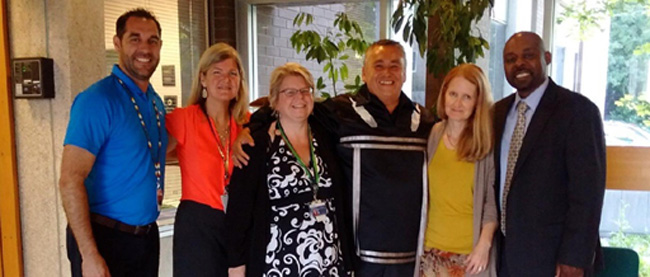Halton District School Board adopting key recommendations from TRC report

By Rick Garrick
OAKVILLE – The Halton District School Board (HDSB) recently voted unanimously to adopt key education recommendations from the Truth and Reconciliation Commission of Canada’s Calls to Action report.
“This is just the beginning and it makes my spirit happy to see this happen for my daughters’ sake and for all the future generations,” says Stephen Paquette, a traditional knowledge keeper whose daughters attend school within the HDSB. Paquette, who was born John Andrew Kimewon but was adopted out of Wikwemikong as a child, delivered the TRC presentation to the HDSB trustees during a June 17 board meeting.
“I have to give the trustee (Tracey Ehl Harrison) the credit on bringing that (motion) forward,” Paquette says. “She took the initiative and wanted to put it officially on the table in front of that board meeting with all of the trustees.”
The motion calls for the HDSB to: commit that all students graduate with knowledge of residential schools and their effects on Aboriginal communities in Canada and see themselves as contributors to reconciliation; voice annual acknowledgement that HDSB is on the traditional territory of the First Peoples; and correspond with the Ministry of Education to urge collaboration with Aboriginal communities and the Ontario Public School Board Association to include treaty education, the history and legacy of residential schools and the impact of the Indian Act in curriculum in a way that gives voice to First Peoples.
“As a school board, we should be leaders,” says Harrison, trustee for Oakville Wards 1 and 2 and an environmental planner who has worked with First Nation communities across Ontario. “When I read these (TRC) recommendations, I felt at the federal level and the provincial level it is going to take a while to work through new policies. But at the local level we can be a bit more nimble. We have a real opportunity to engage the students in real experiences that will be meaningful for them, both our First Nation students and our other students, to start that dialogue and action right now rather than waiting for the province or the feds.”
Harrison worked with Paquette and a number of HDSB staff, including Nicholas Bertrand, HDSB’s instructional program leader for First Nations, Metis, and Inuit Education, to design the motion.
“We’ve really worked hard in this school board over the last five years or so to bring awareness, understanding and a broader sense of the reality around First Nations, Metis and Inuit education,” Bertrand says. “We’ve been going out to places like New Credit or to Six Nations to immerse the people who make decisions at the board (about) the realities of all things indigenous.”
The motion included references to TRC Calls to Action 57, which calls for federal, provincial, territorial and municipal governments to provide education to public servants on the history of Aboriginal peoples; 62, which calls for federal, provincial and territorial governments to make age-appropriate curriculum on residential schools, treaties and Aboriginal peoples’ historical and contemporary contributions to Canada a mandatory education requirement for Kindergarten to Grade 12 students; and 63, which calls for the Council of Ministers of Education, Canada to maintain an annual commitment to Aboriginal education issues.
“If we’re looking at true reconciliation, my concept of reconciliation is around the seven generations concept,” Bertrand says. “It has taken us a long time to get us to where we are today, but when we look forward to the future, we need to look to our youth and the generations to come, and I think education is the ticket.”

